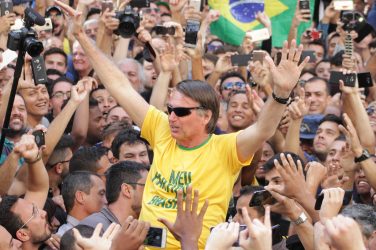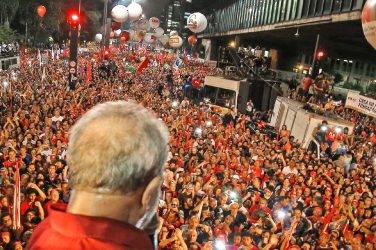 The municipal elections this Sunday, in Brazil, were a disaster for former president Luiz Inácio Lula da Silva and his Workers’ Party (PT). The PT lost four of five state capitals in the races, including São Paulo, where millionaire João Doria, of the Brazilian Social Democratic Party, won outright.
The municipal elections this Sunday, in Brazil, were a disaster for former president Luiz Inácio Lula da Silva and his Workers’ Party (PT). The PT lost four of five state capitals in the races, including São Paulo, where millionaire João Doria, of the Brazilian Social Democratic Party, won outright.
From the 645 municipalities of São Paulo state, the PT was able to elect only 8 candidates for mayor. Compare this to the 2012 elections when 72 were elected.
President Dilma Rousseff, a Lula’s protegée, was just impeached. And the Workers’ Party lost two-thirds of the municipalities it had won in 2012. More than 5,500 municipal mayors’ offices were up for grabs in the regional elections.
For nearly two years, mainstream media and conservative movements have led a nation-wide campaign against the PT, which came to office in 2003 when Lula won the presidency until Dilma Rousseff was impeached in August.
The PT setbacks were surely tied to its being endlessly linked in this campaign to corruption and the Petrobras scandal.

Workers Party supporters say that all the corruption news has only been a smokescreen to remove the PT from power and hide the real corruption of the more conservative parties — PMDB and PSDB — which are now running the government, and which were largely responsible for Rousseff’s impeachment.
According to a recent report by the Brazilian magazine Congresso em Foco, these two parties had the highest number of candidates barred from running for office in Sunday’s elections due to corruption or other charges.
Three hundred and six members of president Michel Temer’s PMDB party were considered ineligible, and 209 members from the conservative PSDB were also barred. The PT was twelfth on the list of ineligible candidates.
The leftist mayoral candidate, Marcelo Freixo, is headed to the second round against evangelical senator Marcelo Crivella in Rio de Janeiro. The news was a bright spot for the Left.
The results for Freixo, from the Socialism and Freedom Party, are already a victory for left forces in a city that has been led by conservative parties for many years.
The current Rio de Janeiro mayor Eduardo Paes has been under fire for months for redirecting teachers’ salaries and education funds toward the Summer Olympics.
Activists have also denounced the Rio government for its policies that repressed and uprooted poor communities to make way for the World Cup and Summer Olympics, caring more about the mega-games than the city’s poorer residents.
Freixo has worked against police violence in Rio and is the current chair of the Defense of Human Rights Commission of the Legislative Assembly.
Second round elections will take place on Oct. 30.
The Election
A total of 144,088,912 voters were eligible to vote in the municipal elections, according to the Superior Electoral Court (TSE). Voters between 15 and 29 years old represent 27% of Brazil’s electorate.
According to the Electoral Court, their vote was decisive in municipal elections. Data from the Brazilian Institute of Geography and Statistics (IBGE) show that Brazil has about 51 million young people aged 15 to 29 years, equivalent to a quarter of the country’s population.
Of these, more than 75% (38,876,290) were eligible to vote in this year’s elections, according to data from the Superior Electoral Court.
The number of candidates for mayor and councilors were also impressive: 496,892 people have submitted their applications to the Brazilian Electoral justice to stand as candidates. They have disputed the votes running for 35 different political parties.
This year, 16,565 candidates ran for the position of mayor of one of the 5,568 Brazilian towns. For the 57,958 positions of councilor, there was a total of 463,375 candidates — on average eight candidates for each position.
An interesting fact is that in 95 municipalities, there was only one candidate running for city council, and these candidates would need only one vote to be elected, which could be given by themselves.
Overall, the vast majority of parties had more candidates for mayors this year than in previous years. Among the six largest parties of the country, only the PT had fewer candidates for mayor in this election than in 2012.
The Brazilian Democratic Movement Party (PMDB), which is the largest party, disputed the election this Sunday with 2,382 candidates.
There is still a gap between male and female candidates in this year’s elections. While 52% of voters are women and 48%, men, for elections disputes, only 32% of candidates were women and 68%, men.
Of the 16,556 candidates for municipal governments 14,418 are male and 2,149 female. According to the TSE, in the dispute for council members, the number of female candidates is nearly 50% of male candidates.
Security
The Superior Electoral Court sent armed forces officers to 315 Brazilian municipalities to ensure security of municipal elections on Sunday. The military officers patrolled polling places in 13 Brazilian states: Acre, Alagoas, Amazonas, Goiás, Maranhão, Mato Grosso, Mato Grosso do Sul, Pará, Paraíba, Rio de Janeiro, Rio Grande do Norte, Sergipe and Tocantins.
Sao Paulo
Public opinion in Brazil before the elections was divided among those supportive of the new administration of president Michel Temer who blame Rousseff for the worst recession in eighty years, and those loyal to the ousted president arguing she was the victim of a congressional coup. Not to mention the ongoing investigations into the jumbo Petrobras corruption scandal.
PT’s São Paulo mayor Fernando Haddad’s broadly progressive and relatively scandal-free four years in office at the end didn’t help due to the current anti-Workers’ Party climate.
In effect a former television host of the Brazilian The Apprentice, João Doria Jr ended up winning Sunday’s vote with over 52% of the vote, become the next mayor of South America’s biggest city.
Despite never having held elected office before, he is now going to take charge of a metropolis with almost 12 million inhabitants. Doria was an enthusiastic supporter of impeachment and has accused the Workers’ Party of “introducing” corruption into Brazil, even when his Social Democracy Party of Brazil and himself have prosecutors investigating claims that among other irregularities Doria used his personal fortune to buy votes in his party’s primary contest.
But much of this phenomenon can be explained by the clash of two PSDB chiefs both with presidential aspirations. In effect Doria is strongly sponsored by the São Paulo state governor Geraldo Alckmin who wanted to prevent party stalwart Andrea Matarazzo getting the nomination and potentially winning the election because Matarazzo is close to Brazil’s new foreign minister, José Serra.
A win for Matarazzo risked boosting Serra’s prestige within the party at the expense of the governor’s just as the two furiously position themselves ahead of the presidential elections set for 2018. Both men want to be president as the candidate of the PSDB.
Having seen Doria best his friend, Serra convinced Matarazzo to quit PSDB and join the Social Democratic Party. From there, he has teamed up with another defector becoming, with Serra’s encouragement, the running mate of Marta Suplicy, mayoral candidate of the catch-all Democratic Movement of Brazil Party, her new political home after quitting the Workers’ Party. Marta, as she is known, was once one of the Workers’ Party’s most high-profile figures.
Though she represented the party as congresswoman, senator, minister and, back at the start of the millennium, mayor of São Paulo, she now claims she was never a leftist.
tS/ABr/MP











